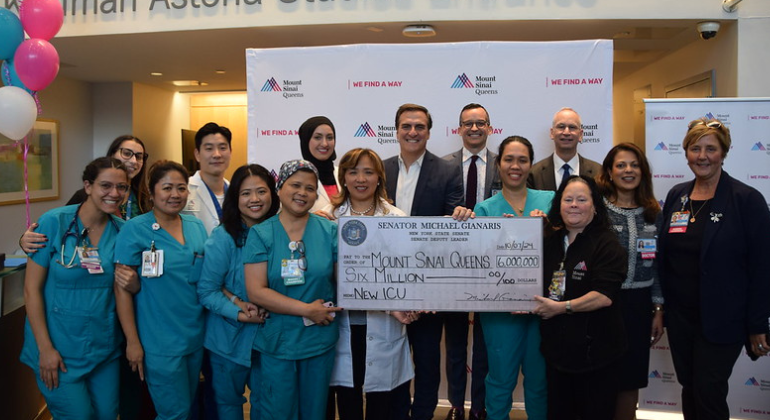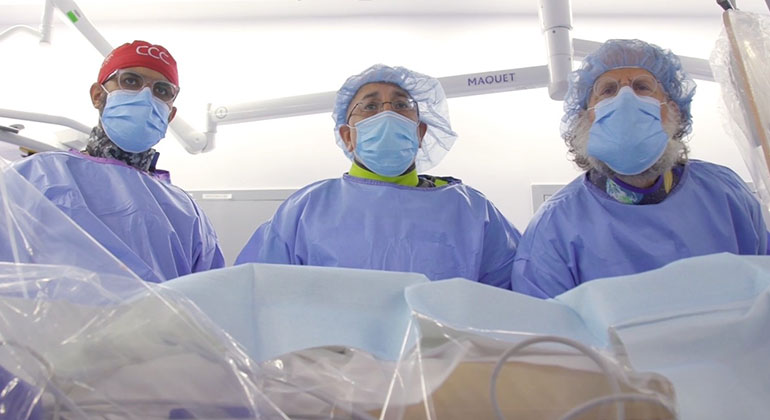The Mount Sinai Health System Enhances Brand Identification for Its Hospitals
Seven hospital campuses and a single medical school serve as basis for integrated health care system.
The Mount Sinai Health System today announced new brand identification for several of its hospitals, building on the principal strengths and world-renowned recognition for excellence of The Mount Sinai Hospital and the Icahn School of Medicine at Mount Sinai. Mount Sinai is one of the largest nonprofit systems in the country with seven hospital campuses and one renowned medical school that serves as the academic and research hub for the entire institution. The system provides increased access to primary and specialty care for local and global communities, as well as an expansive network of ambulatory care centers throughout the New York metropolitan region.
Kenneth L. Davis, MD, Chief Executive Officer and President of the Mount Sinai Health System, said, "In just a few short months, we have taken major steps to bring all components of the Mount Sinai Health System into a more systemic, integrated system. This enhanced brand identification is, in many ways, emblematic of these ongoing efforts."
The hospitals within the Mount Sinai Health System undergoing brand enhancement changes include:
- Mount Sinai Beth Israel (formerly Beth Israel Medical Center, in Manhattan)
- Mount Sinai Beth Israel Brooklyn (formerly Beth Israel Brooklyn)
- Mount Sinai Roosevelt (formerly Roosevelt Hospital)
- Mount Sinai St. Luke's (formerly St. Luke's Hospital)
- New York Eye and Ear Infirmary of Mount Sinai (formerly New York Eye and Ear Infirmary)
The Mount Sinai Hospital in East Harlem and Mount Sinai Queens will maintain their existing names.
More Information on the Hospital Members of the Mount Sinai Health System
- Mount Sinai Beth Israel: An 856-bed teaching hospital founded in 1889 on Manhattan's Lower East Side, Mount Sinai Beth Israel is notable for its unique approach to combining medical excellence with clinical innovation. The hospital has recruited world-class specialists to expand services in heart disease, cancer, neurology, and orthopedics. It also continues its long tradition of excellence in medical specialties including gastrointestinal disease, chemical dependency, psychiatric disorders, pain management and palliative care, and HIV/AIDS research and treatment. The hospital also has significantly advanced its commitment to community-based ambulatory care and expanding patient access to primary and specialty care.
- Mount Sinai Beth Israel Brooklyn: A 212-bed community hospital located in Midwood, Mount Sinai Beth Israel Brooklyn has gone through numerous renovations and upgrades over the past decade to help expand its scope of services. The latest advances include a completely redesigned intensive care unit, new digital mammography equipment, and a state-of-the-art radiology suite. The hospital's Emergency Department also serves as a critical community resource, and it enjoys an excellent reputation in such specialties as cardiac care, general surgery, gynecology, orthopedics, and geriatrics.
- The Mount Sinai Hospital: A 1,171-bed tertiary- and quaternary-care teaching facility founded in 1852, The Mount Sinai Hospital is located on the border between East Harlem and the Upper East Side and serves one of the most diverse patient populations in the world. The hospital consistently earns Magnet status for nursing care, and it is the only medical center in New York State to have earned Disease-Specific Care Comprehensive Stroke Center Certification from the Joint Commission. In the 2013-14 “Best Hospitals” issue of U.S. News & World Report, the institution ranked as one of the top 25 hospitals in seven specialties nationally. Its Kravis Children's Hospital at Mount Sinai was named in U.S. News & World Report's 2013-14 “Best Children's Hospitals” issue with top rankings in 7 out of 10 pediatric specialties.
- Mount Sinai Queens: As a 235-bed licensed acute care facility in Astoria, Mount Sinai Queens provides adult medical and surgical services, with a team of nearly 500 physicians representing about 40 medical and surgical specialties and subspecialties. Recognized as a leader in stroke care, Mount Sinai Queens is designated by the New York State Department of Health and the Joint Commission as a primary stroke center. Between the physicians and staff, 35 languages are spoken at Mount Sinai Queens, illustrating one of the many ways in which the hospital serves its culturally diverse community.
- Mount Sinai Roosevelt: With 505 beds, Mount Sinai Roosevelt is a full-service community and tertiary-care hospital with an Emergency Department serving Midtown and the west side of Manhattan. Since its founding in 1871, the hospital has placed strong emphasis on primary and specialty care. Mount Sinai Roosevelt serves as the home to several renowned clinical services, including those in endovascular surgery, cancer, cardiology, and obstetrics and gynecology. Mount Sinai Roosevelt (as well as Mount Sinai St. Luke's) also maintains a strong primary care presence in its surrounding neighborhoods through ambulatory and physician practices and through longstanding partnerships with some of New York's largest federally qualified health centers, particularly the William F. Ryan Community Health Center.
- Mount Sinai St. Luke's: With 523 beds, Mount Sinai St. Luke's serves as the principal health care provider for the West Harlem and Morningside Heights communities and operates one of Manhattan's few Level 1 trauma services. Founded in 1847, it is home to the Al-Sabah Arrhythmia Institute, a world-class, multidisciplinary center specializing in the care and treatment of heart ailments. Mount Sinai St. Luke's also enjoys an outstanding reputation for services in many other medical specialties, including internal medicine, geriatrics, trauma, bariatric surgery, vascular disease, HIV/AIDS, cardiac care, physical rehabilitation, psychiatric disorders, and substance abuse. Mount Sinai St. Luke's also continues to expand its commitment to community-based ambulatory care and access to primary and specialty care.
- New York Eye and Ear Infirmary of Mount Sinai: With 69 certified beds, New York Eye and Ear Infirmary of Mount Sinai is one of the world's leading facilities for the diagnosis and treatment of all diseases of the eyes, ears, nose, and throat, as well as related conditions. Founded in 1820 as the nation's first specialty hospital, it performs more than 30,000 surgical cases and receives 225,000 outpatient visits per year. The New York Eye and Ear Infirmary of Mount Sinai is regularly ranked as one of the best hospitals in America, according to U.S. News & World Report, and was awarded Magnet status for excellence in nursing care.
About the Mount Sinai Health System
Mount Sinai Health System is one of the largest academic medical systems in the New York metro area, employing 48,000 people across its hospitals and more than 400 outpatient practices, as well as more than 600 research and clinical labs, a school of nursing, and a leading school of medicine and graduate education. Mount Sinai advances health for all people, everywhere, by taking on the most complex health care challenges of our time—discovering and applying new scientific learning and knowledge; developing safer, more effective treatments; educating the next generation of medical leaders and innovators; and supporting local communities by delivering high-quality care to all who need it.
Through the integration of its hospitals, labs, and schools, Mount Sinai offers comprehensive health care solutions from birth through geriatrics, leveraging innovative approaches such as artificial intelligence and informatics while keeping patients’ medical and emotional needs at the center of all treatment. The Health System includes approximately 9,000 primary and specialty care physicians and 11 free-standing joint-venture centers throughout the five boroughs of New York City, Westchester, Long Island, and Florida. Hospitals within the System are consistently ranked by Newsweek’s® “The World’s Best Smart Hospitals, Best in State Hospitals, World Best Hospitals and Best Specialty Hospitals” and by U.S. News & World Report's® “Best Hospitals” and “Best Children’s Hospitals.” The Mount Sinai Hospital is on the U.S. News & World Report® “Best Hospitals” Honor Roll for 2024-2025.
For more information, visit https://www.mountsinai.org or find Mount Sinai on Facebook, Twitter and YouTube.

Mount Sinai Queens Celebrates Grand Opening of Its New Pavilion
Apr 26, 2018 View All Press ReleasesMount Sinai Queens Opens New Outpatient Imaging Facility
Jul 05, 2016 View All Press ReleasesMount Sinai Queens Opens New Expanded Emergency Department
Jun 09, 2016 View All Press ReleasesMount Sinai Health System Celebrates Prestigious Magnet® Recognition
Sep 24, 2019 View All Press Releases
Mount Sinai Queens Celebrates Grand Opening of Its New Pavilion
Apr 26, 2018 View All Press ReleasesMount Sinai Queens Opens New Outpatient Imaging Facility
Jul 05, 2016 View All Press ReleasesMount Sinai Queens Opens New Expanded Emergency Department
Jun 09, 2016 View All Press ReleasesMount Sinai Health System Celebrates Prestigious Magnet® Recognition
Sep 24, 2019 View All Press Releases
